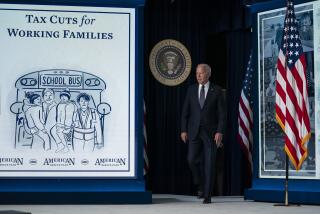Clinton Clashes With Dole Over Abortion Stance
- Share via
MILWAUKEE — In a sudden outburst that brought the presidential campaign to an unseasonably early boiling point, President Clinton on Thursday angrily defended his veto of legislation to ban partial-birth abortions--accusing his Republican critics of being willing to sacrifice women’s health for political gain.
His voice shaking, his face flushed with anger, and his fingers jabbing the air for emphasis, Clinton said that presumed GOP presidential candidate Bob Dole and other critics of his veto were telling women “it’s OK with me . . . if they rip your body to shreds and you could never have another baby even though the baby you were carrying couldn’t live.”
“I am always a little skeptical when politicians piously proclaim their morality,” Clinton told reporters at a joint news conference with German Chancellor Helmut Kohl in Milwaukee. “He [Dole] has to answer to those women.”
Summing up, Clinton said: “I fail to see why his moral position is superior to the one I took.”
Dole actually gave the partial-birth abortion issue relatively low billing Thursday, mentioning it only at the end of a wide-ranging speech on values to a convention of Catholic journalists in Philadelphia, remarks highlighted by a call for a new tax credit to encourage greater donations to charities working with the poor. But Dole’s few comments on the abortion-related veto were pointed.
“Here was an issue where all Americans, or nearly all Americans, can come together,” Dole said. “With his veto, President Clinton pushed the limits of decency too far.”
At the same time he erupted at Dole over abortion, Clinton moved to further close the distance with his rival on two other potentially polarizing social issues--welfare reform and homosexual marriage. And even as he jabbed at Clinton on abortion, Dole emphatically reached out to centrist voters worried that the Republican-led Congress has been too harsh in its efforts to balance the budget.
“Our faith in the Great Society has ended,” Dole declared, “but our moral duties to the poor have not.”
The day spotlighted the unusual contours of the 1996 campaign, which has seen the candidates veer together and apart like magnets with constantly reversing polarities.
Both men made their remarks in states with large Catholic populations, underscoring one of the key political backdrops for their argument over abortion.
Once reliably Democratic, Catholics have moved in increasing numbers toward Republicans in presidential campaigns over the past generation. But recent polls show Clinton holding commanding advantages of 20 to 25 percentage points over Dole among Catholic voters, considered by many analysts to be perhaps the pivotal swing constituency in American politics. Some GOP leaders and Dole advisors believe abortion could serve as the abrasive issue that erodes this Clinton lead.
The partial-birth abortion ban Clinton vetoed last month would have made illegal a relatively rare procedure used to terminate late-term pregnancies. Clinton said he rejected the bill because while it did allow exceptions for cases in which the mother’s life was endangered, it did not authorize the procedure in pregnancies that threatened the mother’s health.
“Why wouldn’t they accept that minor amendment?” Clinton sharply asked Thursday. “Why? Because they would rather have an issue than solve a problem.”
Republicans dismiss Clinton’s explanation as a smoke screen and say he rejected the legislation for fear of angering abortion rights supporters influential in the Democratic Party. After Clinton’s fusillade Thursday, Dole campaign spokesman Nelson Warfield fired back that the president “hit a new low in hypocrisy” and would “stoke the doubts many Americans have about his credibility.”
The argument over abortion put an acrid cap on a day that otherwise saw the two rivals striking a less belligerent tone after days of sharp exchanges on welfare, taxes and the minimum wage.
First, Clinton echoed earlier comments by his White House spokesman and told reporters he would sign a bill Dole has co-sponsored that would discourage legal recognition of gay marriages.
Clinton said that he opposed discrimination against homosexuals and did not consider the issue of gay marriages “a problem that is sweeping the country.” But he unequivocally indicated that he would sign the GOP legislation to allow states to deny legal recognition to gay marriages conducted elsewhere. No states yet sanction the practice, but a Hawaii court decision could eventually lead to gay marriages becoming legal there.
Clinton, who has twice vetoed GOP-designed welfare reform plans, also lauded the basic principles of welfare legislation Dole sketched out earlier this week, including a proposal to give states blanket authority to test welfare recipients for use of drugs. If Congress passed a plan constructed around the principles Dole outlined, Clinton insisted, “I will sign it. And we will put this behind us.”
The president called on Dole to push such a bill through Congress before June 11, the day by which the Kansas senator has said he will resign from office.
Inevitably, the two candidates’ war of words over abortion obscured the significant, but less incendiary, new departure in Dole’s speech: his call for a change in tax law that could substantially shift responsibility for sustaining the poor from government to private charities.
Embracing a proposal promoted by Sen. Dan Coats (R-Ind.) and former Education Secretary William J. Bennett, Dole called for phasing in a new tax credit of $500 for individuals and $1,000 for couples to encourage donations to private organizations that work with the poor.
“The goal is to get funding and authority in the hands of institutions that reclaim lives,” Dole said. “It would present Americans with a stark choice: Give your money to the Department of Housing and Urban Development, or give it to Habitat for Humanity . . . to Big Government, or to Big Brothers and Big Sisters.”
In his Thursday speech, Dole strongly criticized Clinton; he described the administration “as fundamentally adrift, without direction or moral vision.” And he rifled through an assortment of conservative social causes that he has promoted throughout his campaign, from praising school vouchers to condemning the entertainment industry.
But at the core of Dole’s speech was one of his most ambitious efforts yet to lay out an agenda that moves beyond the boundaries of the GOP congressional priorities over the past 17 months. In his remarks, Dole aligned himself more firmly than before with the constellation of “civic conservatives” who maintain that reducing government alone will not solve the nation’s social problems.
Dole pointedly declared, “There are things government can do to help” those in need. Alluding to the aid his neighbors provided him as he recovered from his severe World War II wounds, Dole added: “I do not believe in the hard philosophy of sink or swim, the survival of the fittest . . . because my life is a tribute to people who thought life was bigger and nobler than that.”
In a formulation that vaguely echoed Clinton’s calls for a “third way” in domestic policy, Dole said bolstering private charities that work with the poor offers “a middle ground between public indifference and bureaucratic arrogance.”
His proposed tax credit would make charitable giving substantially more valuable to taxpayers. Currently, taxpayers can deduct charitable donations from their income; those in the top tax bracket now save 40 cents for every dollar they contribute. With the credit, taxpayers would save a full dollar in taxes for every dollar they contribute to charities that work with the poor, for up to $500.
Dole aides refused to offer proposals for offsetting the fiscal impact of the tax credit, which the Joint Committee on Taxation recently estimated would cost $20 billion annually. But in his plan, Coats has proposed cuts in welfare and other government programs.
That prospect raises red flags among many in the charitable community. Sharon Daly, the deputy director of social policy for Catholic Charities, expressed concern that the credit may not inspire enough new giving to offset the potential reductions in programs for the poor.
Clinton has not endorsed the tax credit for charitable giving. But since the 1992 campaign he has praised, in general terms, the idea of giving nonprofit organizations increased responsibility for delivering social services.
Before his news conference in Milwaukee, Clinton met with Kohl for more than an hour Thursday morning. Clinton said that after many visits to Washington in his 14 years as German chancellor, Kohl wanted to see another part of America. They chose Milwaukee because of its German heritage.
Broder reported from Milwaukee and Brownstein from Philadelphia.
More to Read
Get the L.A. Times Politics newsletter
Deeply reported insights into legislation, politics and policy from Sacramento, Washington and beyond. In your inbox twice per week.
You may occasionally receive promotional content from the Los Angeles Times.










